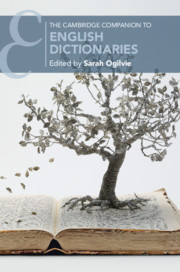Book contents
- The Cambridge Companion to English Dictionaries
- The Cambridge Companion to English Dictionaries
- Copyright page
- Dedication
- Contents
- Illustrations
- Tables
- Notes on Contributors
- Acknowledgements
- Chronology
- Chapter 1 Introduction
- Part I Issues in English Lexicography
- Part II English Dictionaries Throughout the Centuries
- Chapter 8 A Dictionary Ecosystem: Four Centuries of English Lexicography
- Seventeenth-Century English Dictionaries: Hard Words
- Chapter 9 Cawdrey, Coote, and ‘Hard Vsual English Wordes’
- Chapter 10 Seventeenth- and Eighteenth-Century English Lexicography
- Eighteenth-Century English Dictionaries: Prescriptivism and Completeness
- Nineteenth-Century English Dictionaries: Descriptivism
- Twentieth and Twenty-First-Century Dictionaries
- Part III Dictionaries of English and Related Varieties
- Guide to Further Reading
- Index
- Cambridge Companions to Literature
Chapter 9 - Cawdrey, Coote, and ‘Hard Vsual English Wordes’
from Seventeenth-Century English Dictionaries: Hard Words
Published online by Cambridge University Press: 18 September 2020
- The Cambridge Companion to English Dictionaries
- The Cambridge Companion to English Dictionaries
- Copyright page
- Dedication
- Contents
- Illustrations
- Tables
- Notes on Contributors
- Acknowledgements
- Chronology
- Chapter 1 Introduction
- Part I Issues in English Lexicography
- Part II English Dictionaries Throughout the Centuries
- Chapter 8 A Dictionary Ecosystem: Four Centuries of English Lexicography
- Seventeenth-Century English Dictionaries: Hard Words
- Chapter 9 Cawdrey, Coote, and ‘Hard Vsual English Wordes’
- Chapter 10 Seventeenth- and Eighteenth-Century English Lexicography
- Eighteenth-Century English Dictionaries: Prescriptivism and Completeness
- Nineteenth-Century English Dictionaries: Descriptivism
- Twentieth and Twenty-First-Century Dictionaries
- Part III Dictionaries of English and Related Varieties
- Guide to Further Reading
- Index
- Cambridge Companions to Literature
Summary
This chapter considers the appearance of the first monolingual dictionary of English at the beginning of the seventeenth century and its forebears in the late sixteenth century. Robert Cawdrey’s A Table Alphabeticall, a so-called ‘hard words’ dictionary, was first published in 1604, and was preceded by a list published as an addendum to the main predecessor, Edmund Coote’s The English Schoole-Maister of 1596. Cawdrey’s work was addressed to a clientele which was literate but less than fully educated, and in particular, women who were sufficiently educated to teach others, especially in their own households, and to promulgate a religious agenda. Coote’s book was essentially a teaching manual aimed not merely at students, but at the teachers themselves, and was based on a clearly articulated method. These two dictionaries have a close relationship, Cawdrey employing a large percentage of Coote’s entries. This chapter explores that relationship in detail. While many entries are taken over largely unaltered, there are also numerous changes, including expansions, the provision of explanatory material, and new definitions. There are also many deletions from Coote, and the incorporation of terms from other works.
Keywords
- Type
- Chapter
- Information
- The Cambridge Companion to English Dictionaries , pp. 103 - 113Publisher: Cambridge University PressPrint publication year: 2020



